Get Pre-Shipping Consultation and Dedicated Customs Support
Only with DHL Express Business
Register Now
When importing and exporting goods internationally, you need to know your duties and taxes. Duties and taxes are determined by customs in the destination country, and they vary widely from country to country. You or your customer may be asked to pay duties and taxes before the shipment is delivered.
Learn more about Customs, Duties & Taxes.
The Malaysia Customs Department determine the amount of import duties and taxes based on several factors:
Learn more about Harmonised Code.
Valuation is a customs procedure applied to determine the customs value of imported goods. Under the Customs Valuation, the customs value is determined using the transaction value (TV) of the goods to be valued. Transaction Value is to be based on the actual price paid or payable by the importer, which is generally shown on the Commercial invoice.
Are you new to international shipping? Let us help. Save time and estimate your shipment’s duties and taxes with DHL Trade Automation System. Use our system to help take the guesswork out of international trade, as well as to determine your shipment’s Harmonized Code, find required customs documents, and more.
Import duties are levied on goods that are subject to import duties and imported into the country. Import duties are generally levied on an ad valorem basis but may also be imposed on a specific basis. The ad valorem rates of import duties defined in terms of a fixed percentage of value ranging from 0% to 30%.
To calculate import duty on goods imported into Malaysia, add up the value of the goods, freight costs, insurance and any additional costs, then multiply the total by the duty rate. The result is the amount of import duty you'll need to pay customs for your shipment.
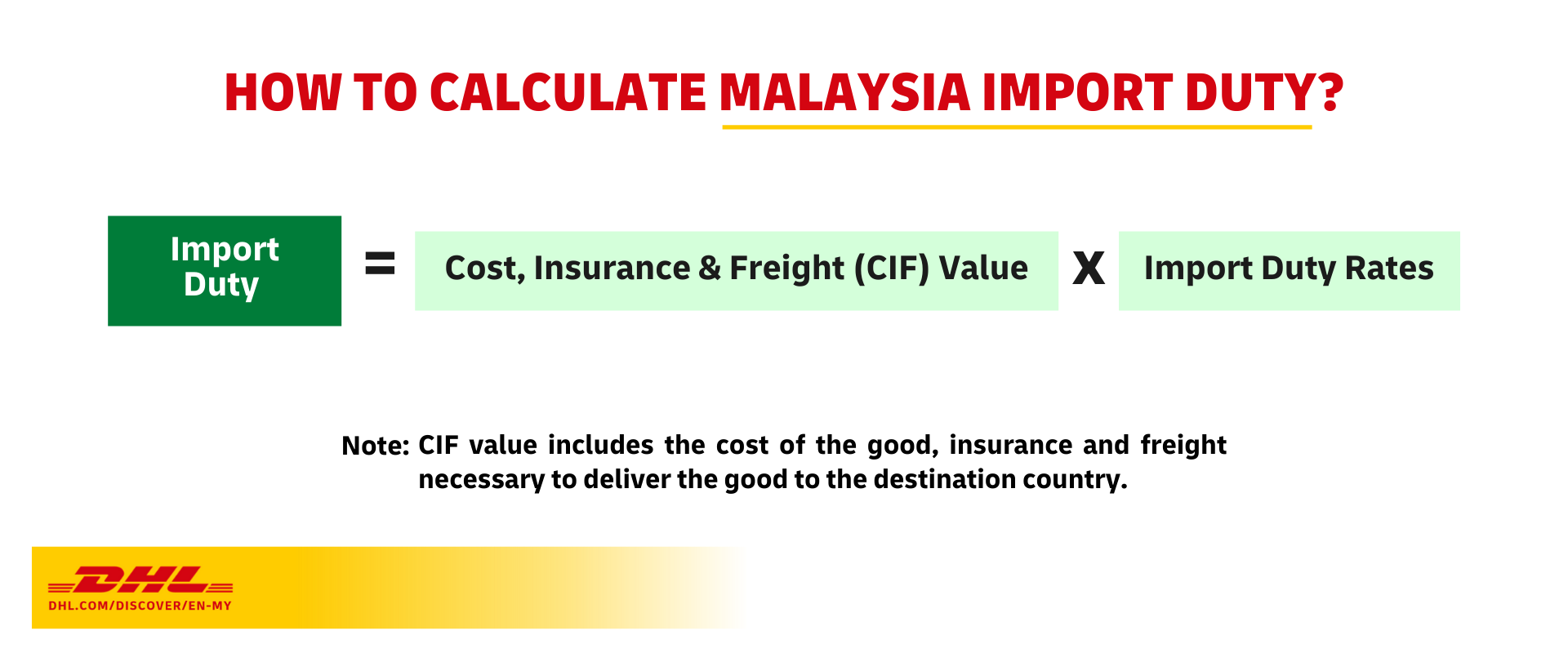
Whether you are sending a package as a gift or an import, it will be subject to duties and taxes depending on the customs authority in the destination country. Effective July 16, 2018, the Sales and Services Taxation (SST) is chargeable on the manufacture of taxable goods in Malaysia and the importation of taxable goods into Malaysia at the rate of 5 or 10 percent, or a specific rate depending on the category of products.
To calculate taxable goods imported into Malaysia, add up the value of the goods, freight costs, insurance, the amount of import duty and the amount of excise duty, multiply by the sales tax rate. The result is the amount of SST you'll need to pay customs for your shipment.
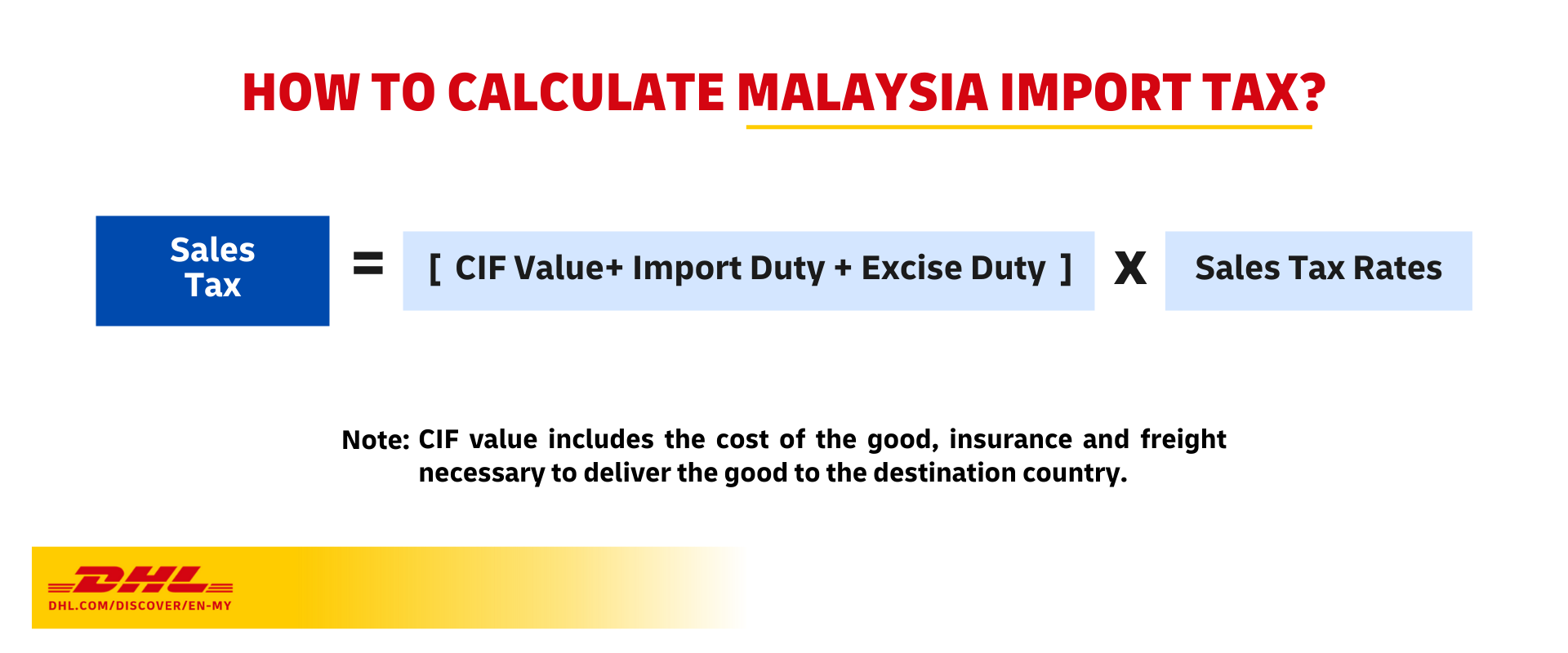
Excise Duty is a duty imposed on dutiable goods manufactured by a company licensed under Section 20, Excise Act 1976. This duty is also imposed on the same goods when imported.
To calculate the excise duty on imported goods, add up the value of the goods, freight costs, insurance and the amount of import duty, multiply by the excise duty rate. The result is the amount of excise duty you'll need to pay customs for your shipment.
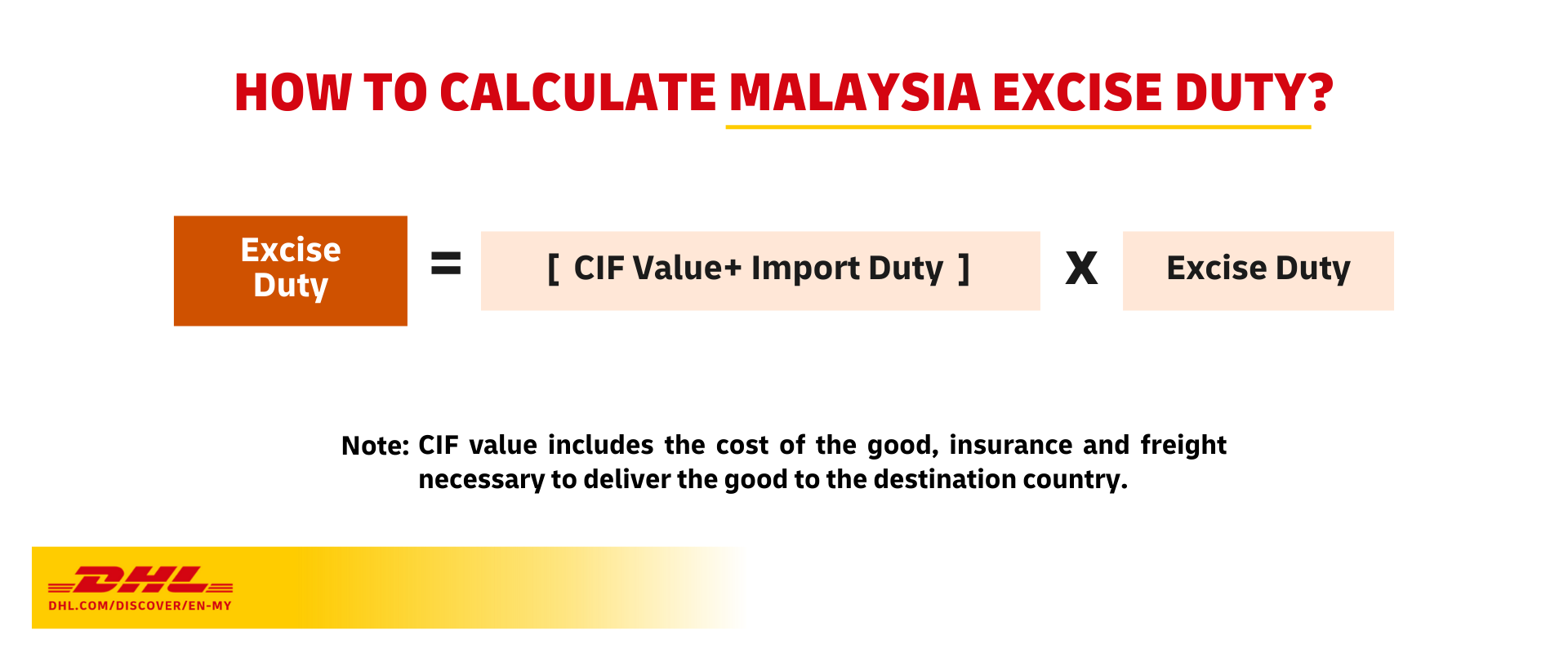
The receiver of the shipment has to pay the duties and taxes before the shipment is released from customs in the destination country
DHL Express facilitates the payment of duties and taxes to the custom authorities on behalf of the customers. If the duties and tax incurred exceeds RM1000, DHL Express will attempt to contact the importer prior to customs clearance. If the duties and tax incurred is below RM1000, we will proceed with customs clearance to expedite the delivery of your shipment.
When customers receive an email or a SMS from DHL Express Malaysia on the payment of outstanding duties and taxes, customers can pay to DHL Express Malaysia via the following methods:
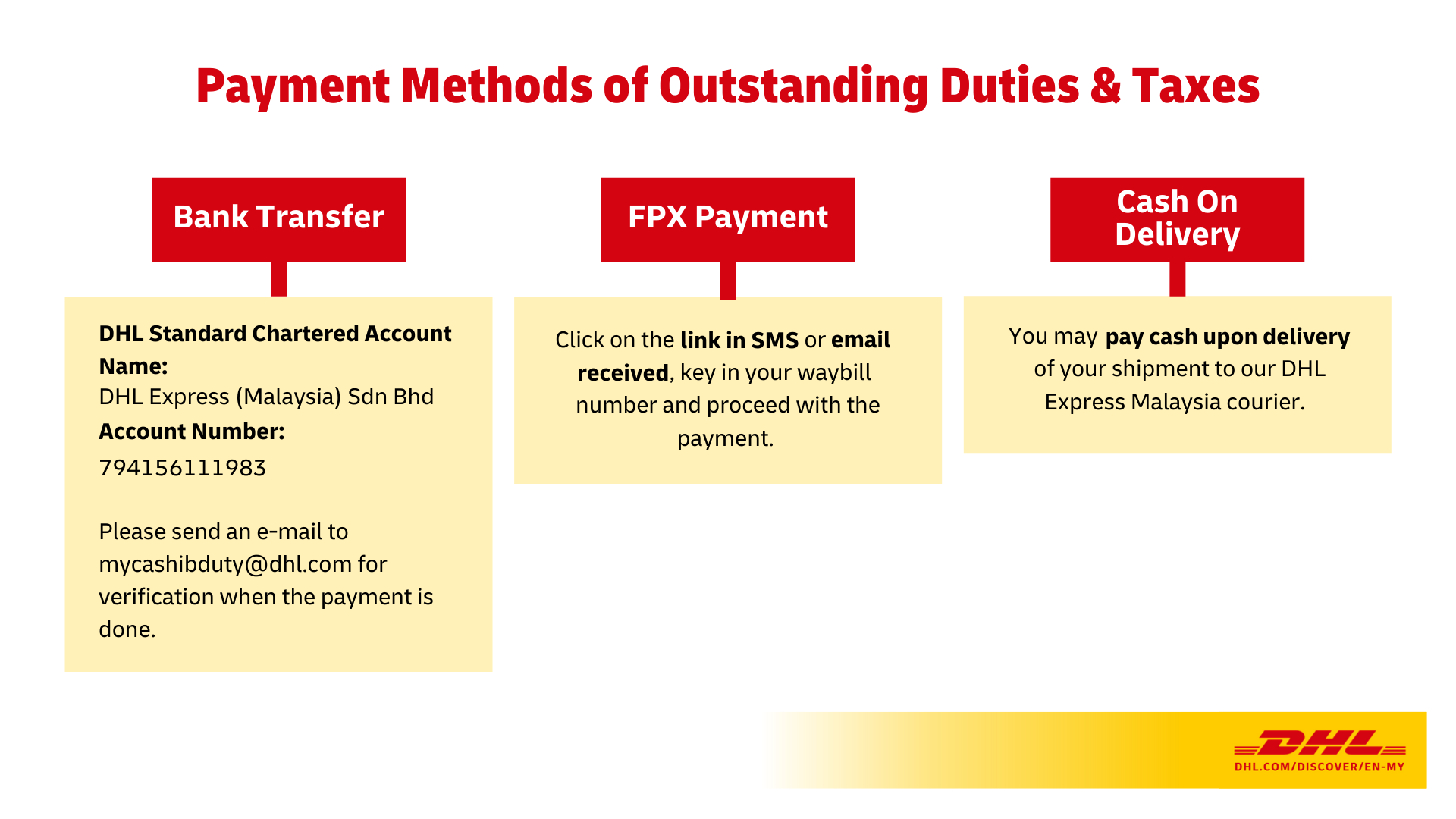
If a customer requires DHL Express to contact customer regardless of duty and tax amount, a Duty Confirmation Fee of RM53 will be charged per shipment.
Goods and Services Tax or GST is a broad-based consumption tax levied on the import of goods. Currently, there are 160 countries in the world that have implemented GST.
In European Union countries, Value-Added tax (VAT) is a sales tax that is collected by the retailer and then paid forward to the government. Businesses charge VAT to their customers, who pay this tax indirectly when they buy anything.
De Minimis value is a value below which goods can be shipped into a country before duties & taxes are assessed.
In Malaysia, the De Minimis value is MYR 500, if you ship a shipment with a Cost, Insurance, and Freight (CIF) value of less than MYR 500, no tax will be levied on its importation into Malaysia.
Download the complete De Minimis value for all countries.
Learning the Language of Incoterms Rules and Trade Terms
Incoterms are terms used in the shipping industry to define the sales contract of shipping products across international borders. They are generally used in sea freight, but they have also been adopted into the air freight industry to outline the responsibilities and risks to be placed on the seller and receiver during an international trade process.
You might come across acronyms like DAP and DTP when you’re in talks about customs clearance. DAP and DTP, both Incoterms as defined by the International Chamber of Commerce, play key roles in global commerce. Let’s take a look at its differences.
Delivered at Place (DAP) indicates that import duties and taxes are not paid for prior to arriving in the destination country. The receiver will have to pay for import duties and taxes when the item arrives at the destination country’s customs. Duties and Taxes Paid (DTP) indicates that the shipper arranges to pay for import duties and taxes in advance.
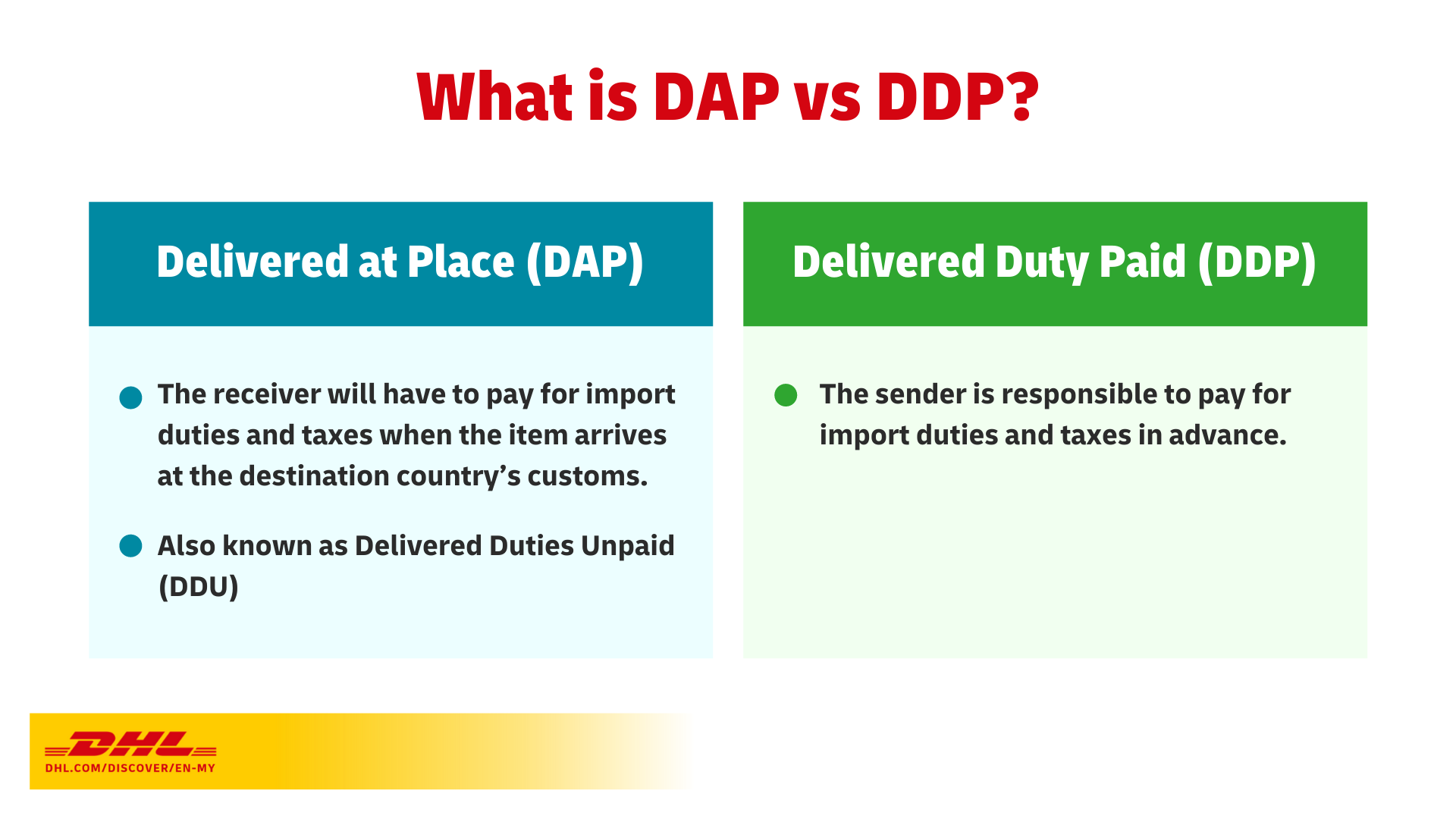
DTP is the most common shipping method because it makes sure that taxes aren't an unexpected surprise for receivers who don't know about them in advance.
You can read more about global Incoterms rules and trade terms by visiting the International Chamber of Commerce website, which includes an FAQ and an explanation of Incoterms rules.
DHL Express take the complexity out of customs with our extensive worldwide customs knowledge and experience as well as strong relationships with government customs and security authorities. We know that a smooth and efficient customs clearance process helps your shipments arrive as quickly as possible. Our broad range of customs services ensure a smooth and on time border crossing of shipments, without administrative burden, delays or penalties.
Find out about Malaysia’s Customs Clearance.
Diverse and ever-changing trade regulations and requirements in different parts of the world create complexities and challenges in shipping.
Designed to help simplify things, the DHL Trade Automation Services (TAS) provides total visibility on critical detailed trade information, all streamlined and customizable to meet your particular needs. With access to millions of critical trade rules, DHL Trade Automation Services users can take full control of the information flows and processes that accompany international shipment transactions. Following are the unique tools available:
Register TAS for free here.